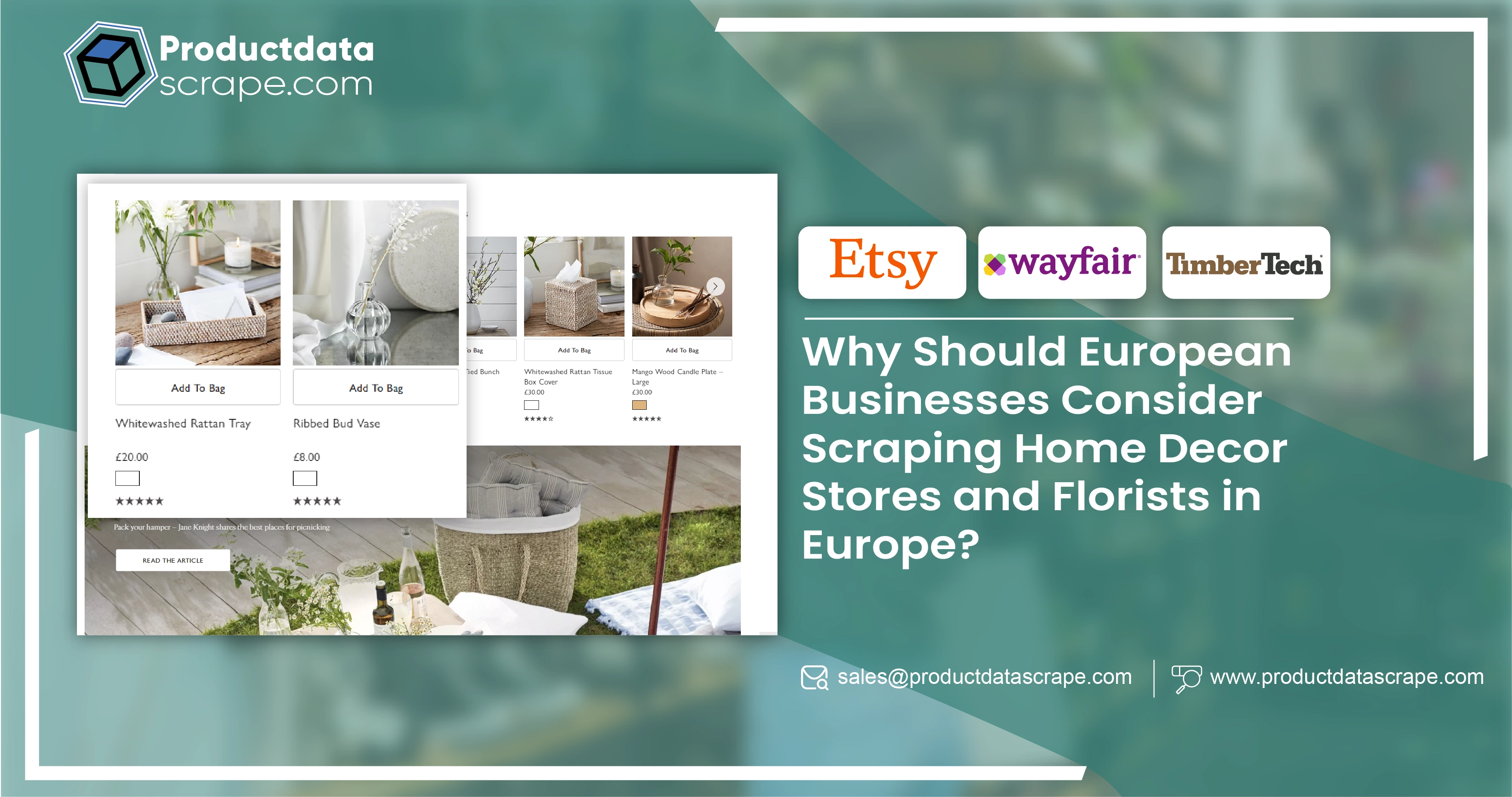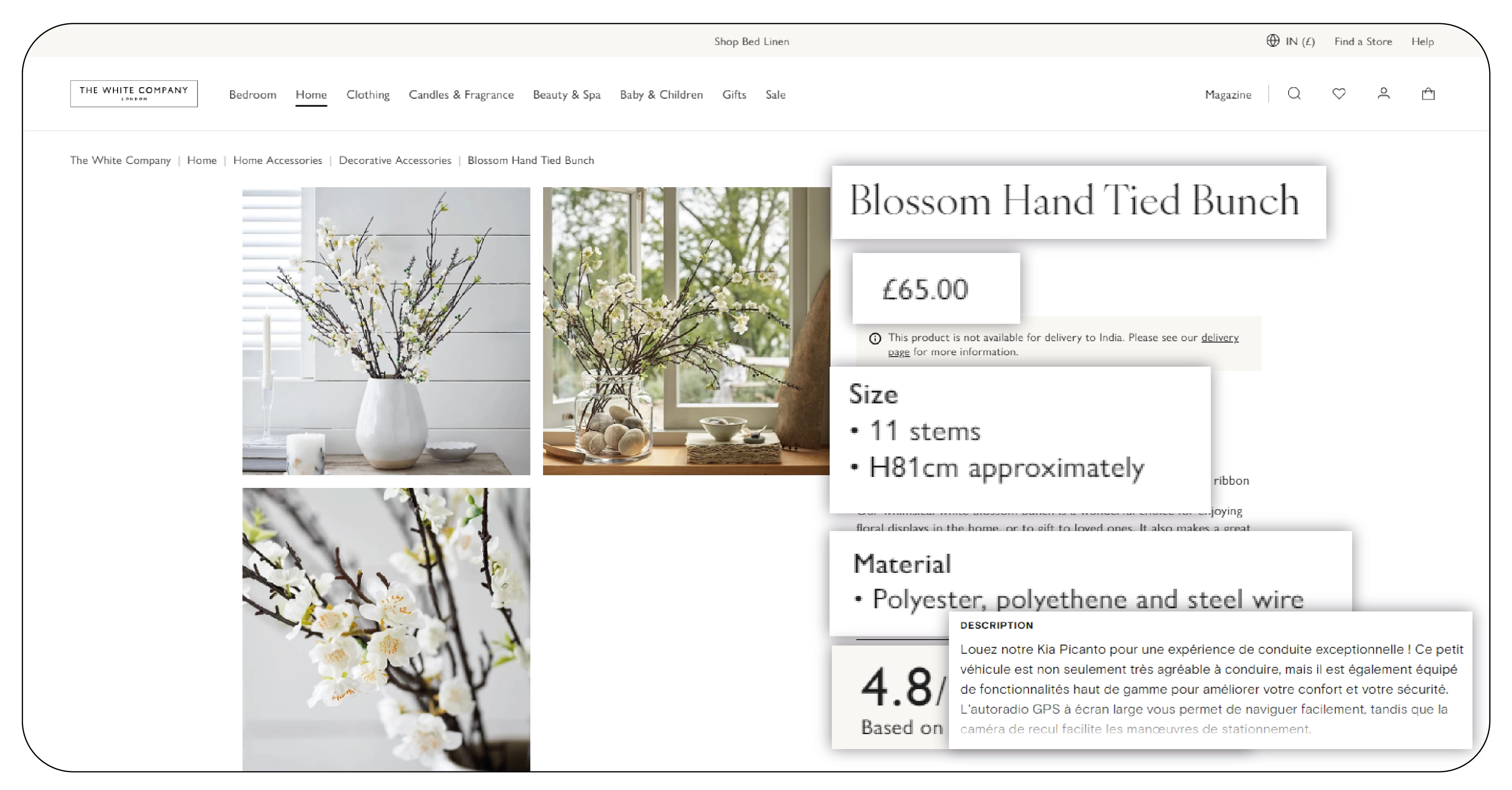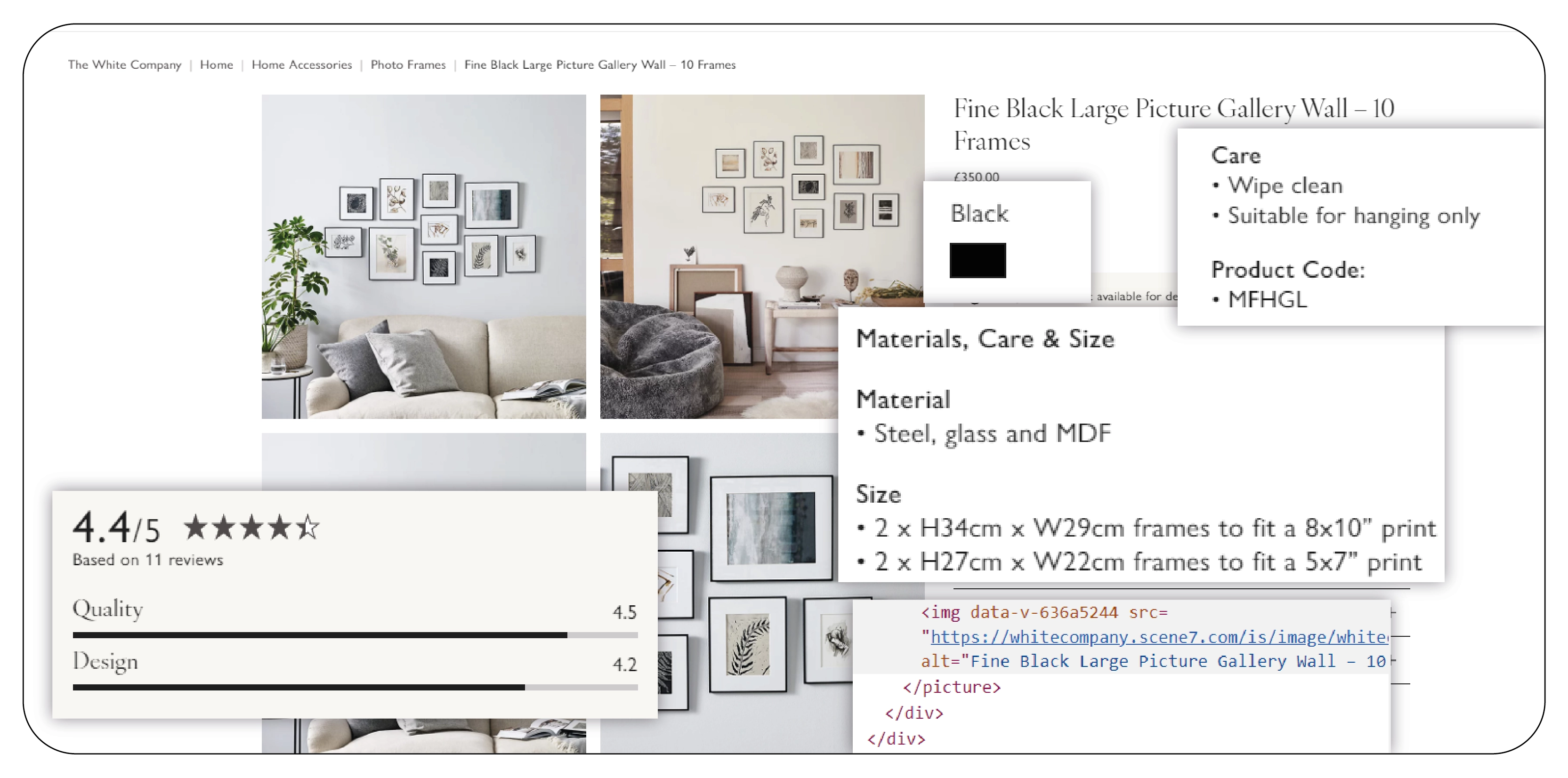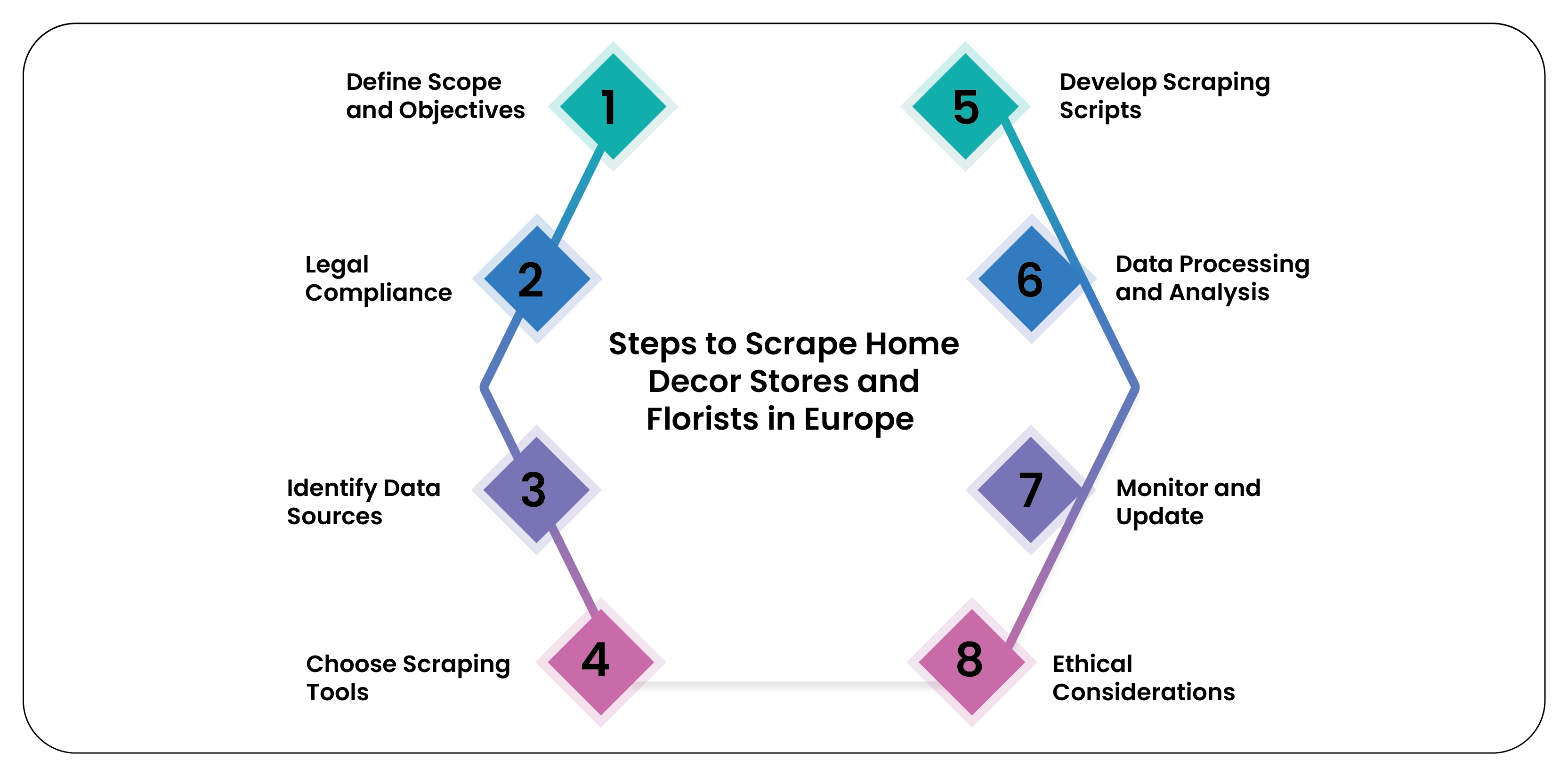
Embarking on a journey to explore the vibrant world of scraping home decor stores and florists in Europe opens doors to many design inspirations and botanical delights. With each region boasting unique aesthetic and cultural influences, uncovering hidden gems and renowned establishments promises an enriching experience for enthusiasts and connoisseurs alike. From the quaint boutiques nestled along cobblestone streets to the chic design studios adorning bustling cityscapes, Europe offers a diverse landscape of creativity and craftsmanship in home decor and floral arrangements. Through the artful curation of furnishings, textiles, and accessories, home decor stores breathe life into living spaces, reflecting individual tastes and lifestyles. Simultaneously, florists weave magic with blooms and foliage, transforming events and everyday moments into memorable celebrations of nature's beauty. Harnessing the power of data scraping, we delve into this captivating realm, uncovering a tapestry of businesses eager to inspire and elevate living environments across the continent.
Types of Data Collected from Home Decor Stores

When scraping data from home decor stores, valuable information can be collected to enrich your dataset and enhance your understanding of the market. Here are the types of data commonly collected:
Business Name: This is the primary identifier of the store, providing insight into its branding and identity.
Email Address: While generic info@ addresses are shared, scraping for specific email addresses associated with the store's domain or dedicated contact addresses can provide more direct lines of communication.
Country: Knowing each store's geographical location helps categorize and analyze the data by region or country.
Website: The store's website is a hub for information about its products, services, and contact details. Scraping website URLs allows for easy access to further information.
Contact/Person Name: If available, identifying specific store contacts, such as owners, managers, or sales representatives, can facilitate personalized communication and relationship-building.
Physical Address: Obtaining the street address of each store provides valuable information for mapping and geographical analysis. It also allows customers to locate the store physically.
Phone Number: Including phone numbers enables customers to contact the store directly for inquiries, orders, or customer support.
Social Media Profiles: Scraping social media links or handles allows for further engagement and interaction with the store's audience. It provides insights into the store's online presence and marketing strategies.
Product Categories: Gathering information about the types of products each store offers, such as furniture, lighting, textiles, etc., helps categorize and analyze the data based on product specialization.
Price Range: If available, noting the price range of products sold by each store gives insights into their positioning in the market and their target customer demographics.
Customer Reviews/Ratings: Extracting reviews or ratings from platforms like Google Reviews, Yelp, or Trustpilot provides valuable feedback on the store's products and services, helping potential customers make informed decisions.
Special Offers/Promotions: Collecting information about ongoing promotions, discounts, or special offers allows targeted marketing campaigns and competitive analysis.
By collecting these types of data, you can create a comprehensive database of home decor stores, enabling targeted marketing efforts, market analysis, and strategic decision-making within the industry.
How can European Businesses benefit from Scraping Home Decor Stores Data?

By unlocking the power of data, European businesses stand to gain invaluable insights and strategic advantages by scraping home décor data. From market intelligence to personalized marketing, harnessing this data empowers businesses to tailor their strategies, optimize operations, and thrive in the competitive landscape of the home decor industry.
Localized Trend Identification: Home Décor data scraping services allow businesses to identify localized trends and preferences. Analyzing data from different regions and cities allows businesses to tailor their product offerings and marketing strategies to specific geographic areas, maximizing relevance and appeal to local customers.
Seasonal Demand Forecasting: Businesses can gather information on seasonal demand patterns for home decor products through data scraping. By analyzing historical sales data and trends, businesses can accurately forecast demand for specific products during different seasons and holidays, allowing for better inventory planning and marketing campaign preparation.
Supplier Negotiation Advantage: By scraping data on product prices and availability from home decor stores, businesses can gain leverage in negotiations with suppliers. With information on competitor pricing and market demand, businesses can negotiate better terms, lower prices, and exclusive deals with suppliers, ultimately improving their profit margins and competitiveness.
Sustainable Product Development: Scraped data can provide insights into consumer preferences for sustainable, eco-friendly home decor products. By analyzing product reviews, ratings, and customer feedback data, businesses can identify growing demand for sustainable materials, energy-efficient designs, and environmentally friendly production practices, guiding their product development efforts towards more sustainable options.
Cross-Selling Opportunities: Businesses can identify cross-selling opportunities through home decor data scraper by analyzing customer purchasing patterns and product associations. By understanding which products are frequently purchased together, businesses can create targeted cross-selling campaigns, bundle complementary products, and offer personalized recommendations to customers, increasing average order value and driving additional revenue.
Interior Design Trends Analysis: Scraping retail website data lets businesses stay updated on the latest interior design trends and styles. By analyzing data on product categories, colors, patterns, and materials, businesses can identify emerging design trends and incorporate them into their product offerings, ensuring they remain relevant and appealing to design-conscious customers.
These unique points highlight ways European businesses can leverage scraped data from home decor stores to gain competitive advantages, improve decision-making, and drive business growth in the dynamic home decor market.
Steps to Scrape Home Decor Stores and Florists in Europe

Scraping data from LinkedIn, competing brands or data suppliers for home decor stores and florists in Europe can be a complex process that requires careful consideration of legal and ethical implications. Here are general steps to scrape data from these sources:
Define Scope and Objectives: Clearly outline the specific types of data you aim to collect, such as store information, product details, pricing, or customer reviews. Identify the geographic regions, industry sectors, and target audience within Europe.
Legal Compliance: Ensure compliance with data protection laws such as GDPR (General Data Protection Regulation) in Europe. Please familiarize yourself with LinkedIn's terms of service and scraping policies to avoid violating them.
Identify Data Sources: Explore LinkedIn profiles of home decor stores, florists, and competing brands to gather information such as company names, locations, contact details, and employee profiles. Consider using data suppliers or APIs that provide access to structured data relevant to your objectives.
Choose Scraping Tools: Select appropriate scraping tools or software capable of extracting data from LinkedIn profiles, websites, or APIs. Popular tools include web scraping frameworks like Scrapy and BeautifulSoup or specialized LinkedIn scrapers.
Develop Scraping Scripts: Develop custom scraping scripts tailored to extract relevant data fields from LinkedIn profiles or websites of home decor stores, florists, and competing brands. Ensure your scripts handle pagination, dynamic content, and rate limiting to avoid detection and blockage by LinkedIn or other platforms.
Data Processing and Analysis: Process scraped data to clean, normalize, and structure it into a usable format such as CSV, JSON, or database entries. Analyze the collected data to derive insights, identify trends, and inform business decisions related to market research, competitor analysis, or marketing strategies.
Monitor and Update: Monitor data sources for changes, updates, or new information. Regularly update your scraping scripts to adapt to any modifications in website layouts, data formats, or anti-scraping measures implemented by LinkedIn or other platforms.
Ethical Considerations:
- Exercise caution to respect the privacy and rights of individuals and businesses whose data you scrape. You must avoid scraping sensitive or personal information without proper consent.
- Be transparent about your data collection practices and ensure compliance with relevant laws and regulations.
By following these steps, European businesses can effectively scrape data from LinkedIn, competing brands, or data suppliers to gain valuable insights and competitive home decor and floristry advantages. However, it's essential to approach data scraping ethically and legally, respecting the rights and privacy of data subjects.
Conclusion: Scraping data from home decor stores offers European businesses a powerful tool for market intelligence, competitive analysis, and strategic decision-making. By harnessing this data, businesses can gain valuable insights into consumer preferences, market trends, and competitor strategies. From personalized marketing campaigns to optimized pricing strategies and product development initiatives, scraping home decor store data enables businesses to stay agile, responsive, and ahead of the curve in the dynamic landscape of the home decor industry. However, businesses must approach data scraping ethically and legally, ensuring compliance with data protection laws and respecting the rights and privacy of individuals and businesses.
At Product Data Scrape, ethical principles are central to our operations. Whether it's Competitor Price Monitoring or Mobile App Data Scraping, transparency and integrity define our approach. With offices spanning multiple locations, we offer customized solutions, striving to surpass client expectations and foster success in data analytics.




































.webp)






